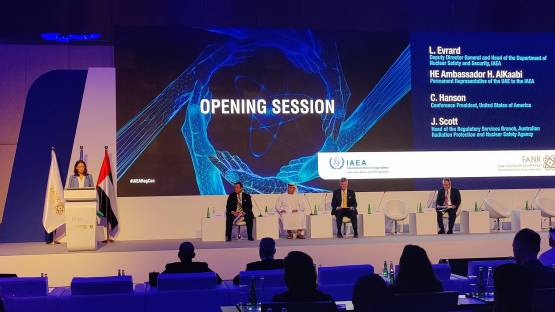Rapid technological advancements in nuclear applications, emerging issues related to climate and other unexpected threats are evolving the regulatory landscape towards ensuring the safety and security of nuclear and radiation applications. Regulating nuclear installations under new external hazards and adapting regulations to new digital and advanced technologies, are focusing attention towards strengthening regulatory resilience.
To support these developments, in one of the biggest conferences of nuclear and radiation regulators in the world, more than 600 participants from 95 IAEA Member States and four international organizations have gathered in Abu Dhabi this week at the International Conference on Effective Nuclear and Radiation Regulatory Systems. Participants will exchange regulatory practices, such as strategies for public and stakeholder involvement during the regulatory process, sustainable capacity building techniques and regulatory programmes related to the full lifecycle of nuclear and radiation facilities.
“This week’s conference is a flagship conference for nuclear safety and security. The topics covered will address some major changes faced over the past three years, that include the increasing interest for new and innovative technologies, the global COVID-19 pandemic that brought its share of change, and in some contexts extremely difficult conditions we have been experiencing for ensuring nuclear safety and security,” said Lydie Evrard, IAEA Deputy Director General and Head of the Department of Nuclear Safety and Security.
“We have had to adapt our way of working to address these new challenges, while keeping the focus on maintaining nuclear safety and security. Collectively we can develop our capacity to be more resilient while facing unexpected and unprecedented situations and working together will cement our continued commitment and combined efforts to strengthen nuclear safety and security worldwide,” Evrard added.
The four-day conference, organized by the IAEA and hosted by the Government of the United Arab Emirates (UAE), is the sixth of its kind in a series of conferences on effective nuclear and radiation regulatory systems over the last 17 years.
“This conference plays a vital role for the global community of regulators, in enhancing nuclear safety and security worldwide,” said Shahid Mallick, Director of the IAEA Office of Nuclear Safety and Security Coordination, and conference Scientific Secretary. “Discussions will focus on how regulatory agility and resilience in a rapidly changing environment help in achieving effective and sustainable regulatory systems to ensure robust nuclear safety, radiation safety and nuclear security worldwide. The facilitating role of international cooperation will also be highlighted.”







